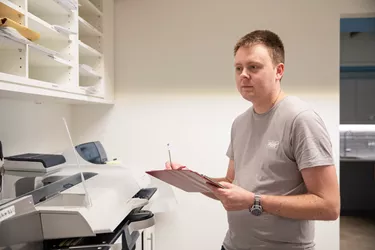How workplace changes have made the difference
Ian has seen first-hand the positive changes to workplace cultures around mental health. But there's still more to be done.
I’ve experienced anxiety and depression for many years, though my depression is less painful than it used to be, apart from occasional horrible days.
I work in the public sector and enjoy my job, but for years my work has been affected by my mental health conditions. In the 1990s, I experienced a cripplingly bad attack of depression. I was admitted to a psychiatric ward for two weeks and had a further two weeks away from work.
Coming back to work was a nightmare. On my first day back, I was greeted by my manager, clutching a pile of papers: “Which ones would you like to take off me?”
It was a very difficult introduction to work. I didn’t feel that I could tell the rest of my team about what had happened. Work continued to be challenging. Almost inevitably, within a couple of weeks, I ended up in hospital again.
“My manager may never have spoken to anyone about mental health before.”
Looking back, I am still upset that my manager didn’t help me more. But perhaps I could have been clearer about what I needed. Neither of us had the language or confidence to talk about mental health issues at work. My manager may never have spoken to anyone about mental health before. I was very used to talking to doctors about the medical side of depression, but I found it much more difficult to talk to my manager, colleagues or even my friends about what that meant in real life.
Over the years, my mental health gradually improved to the extent that I felt I could take myself off my medication, but unfortunately, this didn’t work for me. Suddenly my symptoms returned, and I fell to pieces at work. But this time, I was much better treated.
I received several free sessions of counselling, and I was treated with kindness and respect by my managers. If I needed to escape from the office, I was allowed to go and wander around the park. When my mother died during this period (a terrible shock), my managers allowed me to take a generous amount of compassionate leave. When I had another serious meltdown at work, a manager came along with me to A&E and waited with me until I was seen.
Since then, my depression has gradually eased, helped by the medication I’d previously abandoned. However, my anxiety has, for some reason, increased. This makes work more difficult, but I continue to receive strong support from managers and colleagues. As an example, I’ve been offered a series of workplace adjustments. For instance, I don’t have to attend particularly stressful meetings, but I can make my contribution by working on the preparations for them.
It has helped me contribute effectively to our team’s work while allowing me to avoid situations that would make my anxiety worse.
We now have a support group at work for people affected by mental health, whether as an individual or managers. We have monthly meetings where we can share coping techniques and swop useful sources of information and assistance. We have also set up a buddying network, offering informal support to managers and individuals.
“Talking about mental health needn’t be as challenging as we might think.”
Why have attitudes to mental health at work changed over the years? Why am I treated so much better now than I was previously? Partially, it’s down to human kindness.
There’s also been some remarkable campaigning by the mental health charities. Talking about mental health needn’t be as challenging as we might think. Managers sometimes worry about using the wrong language, but there is plenty of good advice available. And as Time to Change says, you don’t have to be an expert to talk about mental health. A good listener with a genuine interest in people can quickly become a successful manager of a colleague experiencing a mental health problem.
Many employers now realise, perhaps for the first time, that supporting people with mental health conditions at work is really important and rewarding. I know that I work much more effectively because of the support and kindness I receive. But I hear many first-hand stories from people who have been treated worse than me. There are still employers out there who need to learn.
Mind’s Workplace Wellbeing Index is the benchmark of best policy and practice in workplace mental health. Find out more and sign up today at mind.org.uk/index.


Information and support
When you’re living with a mental health problem, or supporting someone who is, having access to the right information - about a condition, treatment options, or practical issues - is vital. Visit our information pages to find out more.
Share your story with others
Blogs and stories can show that people with mental health problems are cared about, understood and listened to. We can use it to challenge the status quo and change attitudes.

















